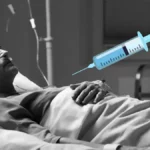MAiD / Euthanasia
The Post-Christian West: Times columnist says that the sick, elderly should consider euthanasia
The legalization of assisted suicide and euthanasia have come at a predictable time. After decades of legal abortion and contraceptive use, not a single Western country has a birth rate remotely close to population replacement level. Increasingly aging populations are putting enormous pressure on healthcare systems with fewer taxpayers to support them. The strategy of importing immigrants from other cultures to make up for the babies Westerners have avoided through contraception or killed by abortion comes with its own manifest problems.
It isn’t just population implosion. Rates of mental illness, social atomization, loneliness, and anxiety have never been higher. Legal euthanasia essentially serves as a pressure valve – a cynical way of addressing the problems we have created with the Sexual Revolution that we are unwilling or unable to solve.
As Ross Douthat noted in a 2022 New York Times column on Canada’s euthanasia regime, we are discovering what it means when a “society remains liberal but ceases to be civilized.” In the cavalcade of Canadian horror stories, he observed, we “see the dark ways euthanasia interacts with other late-modern problems – the isolation imposed by family breakdown, the spread of chronic illness and depression, the pressure on aging, low-birthrate societies to cut their healthcare costs.”
Indeed, Canada, the U.K., and elsewhere, euthanasia advocates have been open about the fact that bringing in assisted suicide comes with critical cost savings. As one 2017 CBC report delicately put it: “Medically assisted deaths could save millions in health care spending.”
Critics of legal euthanasia have long cited the fact that “medical assistance in dying” swiftly morphs from a choice to an obligation. Every euthanasia regime delineates who is eligible for this “right” and who is not, indicating to the sick and the suffering that the state views their lives as not worth living, and that thus they have been granted the autonomy to acquire a state-sanctioned, funded, and facilitated suicide. Ashley Frawley worries, in a recent Unherd column, that “Assisted dying advocates are losing their compassion.” Indeed, both euthanasia and abortion have been sold to the public under the cloak of compassion. A darker agenda lurked just beneath the surface for anyone willing to peer past the slogans.
Frawley was responding to a recent column in The Times by Matthew Parris, a former politician and homosexual activist. Parris’s column is unique in that he is willing to say, in writing what suicide activists deny that they’ve been saying in private. The title and subheading sum it up: “We can’t afford a taboo on assisted dying: The argument against it is that pressure will grow on the terminally ill to hasten their own deaths – that’s not a bad thing.” In short, critics of euthanasia regimes have been pointing out that people are being pushed into lethal injections. Parris responds by saying that this is a good thing, actually – and then defends it with the cold-blooded pragmatism of someone who knows that there isn’t enough to go round:
Let’s acknowledge and confront the strongest argument against assisted dying. As (objectors say) the practice spreads, social and cultural pressure will grow on the terminally ill to hasten their own deaths so as ‘not to be a burden’ on others or themselves. I believe this will indeed come to pass. And I would welcome it.
I don’t dispute the objectors’ belief that once assisted dying becomes normalised we will become more apt to ask ourselves for how much longer we can justify the struggle. Is life still giving us more pleasure than pain? How much is all this costing relatives and the health service? How much of a burden are we placing on those who love us? How much of a burden are we placing upon ourselves? We will notice others asking themselves these questions and we’ll feel empowered by changing social norms to ask them ourselves. Discussion will become more open. It will become common practice to pose this question without embarrassment, and to weigh the answer up.
In his first few paragraphs, Parris dismisses religious concerns about suicide out of hand, and moves swiftly and smoothly to utilitarianism. Speeding up granny’s conveyer belt is a feature, not a bug; the sick and the vulnerable should consider not just their own pain, but whether or not they have become an inconvenient pain and should consider accessing the freshly minted human right to suicide by doctor. This, Parris writes, is “empowering.” Parris goes on to say that our societies are “weighed down by low birth rates and high longevity” – in other words, we’ve legalized abortion, and that makes euthanasia inevitable.
Many writers have commented, of late, that the post-Christian West is shifting back to paganism, including the French philosopher Chantal Delsol and the British writer Louise Perry. Matthew Parris, however, sums it up without apology or prevarication:
It may sound brutal, but I don’t apologise for the reductivist tone in which this column treats human beings as units – in deficit or surplus to the collective. For a society as much as for an individual, self-preservation must shine a harsh beam on to the balance between input and output. To protect its future, a healthy society must adapt its norms, its cultural taboos and its moral codes. This does not usually happen by decree but by a largely unconscious general creep. People begin changing their minds, often unaware of why.
I suspect – and believe I notice – that our culture is changing its mind about the worth of old age when coupled with crippling degeneration, incapacity, indignity and often suffering. If I’m right, our growing interest in assisted dying may reflect a largely unconscious realisation that we simply cannot afford extreme senescence or desperate infirmity for as many such individuals as our society is producing. “Your time is up” will never be an order, but – yes, the objectors are right – may one day be the kind of unspoken hint that everybody understands. And that’s a good thing.
There you have it. In the absence of the Christian worldview, you cannot have a Christian society. Our culture is “changing its mind about the worth of old age” because our culture has abandoned the religion that gave rise to human rights. We have purchased our autonomy at the price of millions of aborted children; those were the children who would have paid for a society that cares for the old. If we throw away the young, the old are sure to follow, while the future is handed to imported populations of immigrants with different cultures and different values. Our post-Christian civilization was always living on borrowed time.
As it says in Proverbs 12 – and I’ve thought of this verse often since the euthanasia debate began in Canada – “the tender mercies of the wicked are cruel.”








